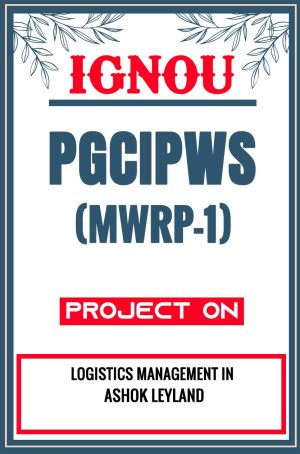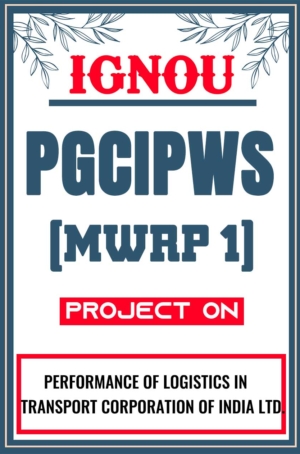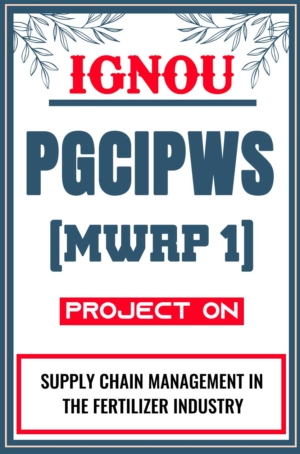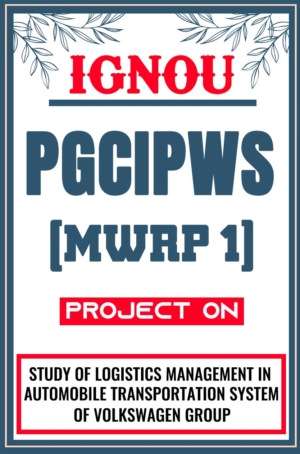Buy IGNOU PGCIPWS Project for MWRP 01
The IGNOU Post Graduate Certificate in Industrial Project Work in Water Supply (PGCIPWS) is a specialized project course offered under MWRP-01. It is intended for students pursuing studies in water resources management, with the goal of providing them with hands-on experience in addressing actual difficulties linked to water supply systems.
The IGNOU PGCIPWS Project for MWRP 01 is the culmination of the program’s theoretical knowledge, requiring students to identify, analyze, and propose solutions to real-world water supply management concerns. Water quality monitoring, treatment methods, pipeline distribution systems, difficulties to urban water supply, and sustainable management strategies are typical topics.
Students must choose a specific topic, do thorough research, and describe their findings in a comprehensive project report. The project entails data collecting, field visits, and scientific analysis, all of which promote problem-solving and critical thinking skills.
IGNOU PGCIPWS Project stresses practical application, in line with IGNOU’s learner-centric approach. The project report is evaluated on the basis of its originality, methodology, and practical application. Guidance from academics or academic counselors ensures that students follow IGNOU’s academic requirements.
Whatsapp us to get the Personalized (Customized) IGNOU PGCIPWS Project Report and Synopsis
Download PDF Link for IGNOU PGCIPWS Project (MWRP 01)
What are the guidelines for selecting a topic for the IGNOU PGCIPWS Project?
When selecting a topic for the IGNOU PGCIPWS Project, students should adhere to the following guidelines:
- Relevance to Water Supply Systems: The topic must focus on issues, innovations, or challenges in water supply systems, such as water quality, distribution networks, resource sustainability, or treatment technologies.
- Practical Significance: Choose a topic that addresses real-world problems or scenarios, providing scope for practical application and fieldwork.
- Alignment with Program Objectives: Ensure the topic aligns with the objectives of the PGCIPWS program, emphasizing sustainable water resource management and problem-solving.
- Feasibility: Select a topic that is manageable within the available time, resources, and access to data or field sites. Avoid overly broad or complex topics that may be difficult to complete.
- Originality: The topic should not replicate existing research without adding new insights. Original contributions or localized studies are encouraged.
- Data Availability: Ensure the availability of reliable data sources, such as government reports, surveys, or case studies, for the selected topic.
- Interdisciplinary Approach: Topics that integrate aspects of engineering, social sciences, and environmental sustainability can enhance the scope and depth of the project.
- Approval from IGNOU: Submit the chosen topic for approval to the academic counselor or project supervisor, ensuring it meets IGNOU’s standards.
How can students gather field data for the IGNOU PGCIPWS Project?
Students can gather field data for the PGCIPWS Project by following these steps:
Identify the Study Area
- Select a specific location or water supply system related to the project topic, such as an urban water distribution system, rural water supply scheme, or industrial water treatment facility.
Define Objectives
- Clearly outline the type of data required, such as water quality parameters, pipeline distribution efficiency, or consumer feedback, based on the research objectives.
Use Surveys and Questionnaires
- Design surveys or questionnaires to collect data from stakeholders, including residents, water utility staff, or industrial water users. Ensure questions are relevant and easy to understand.
Conduct Field Visits
- Visit the chosen site to observe processes, infrastructure, or challenges firsthand. Take notes, photographs, and measurements as required.
Collect Water Samples
- Gather water samples from various sources for testing parameters like pH, turbidity, dissolved oxygen, and contaminants. Use standard water sampling procedures and collaborate with labs for accurate analysis.
Engage with Authorities
- Seek permission and support from local water supply departments, municipal bodies, or NGOs to access official records, operational data, and insights.
Refer to Secondary Data
- Supplement field data with secondary sources, such as government reports, academic studies, or industry publications, to validate findings and add depth.
Use Technology
- Employ tools like GPS for location mapping, mobile apps for data recording, or software like Excel for organizing data efficiently.
Follow Ethical Guidelines
- Ensure data collection is ethical, maintaining transparency, confidentiality, and obtaining consent from participants when needed.
How does the IGNOU PGCIPWS Project for MWRP 01 contribute to water supply management knowledge?
The PGCIPWS Project plays a significant role in advancing water supply management knowledge by bridging theoretical understanding and practical application. Here’s how:
1. Real-World Problem Solving
Students address real-world obstacles in water supply systems, such as distribution inefficiencies, water quality concerns, and resource sustainability. This promotes new solutions that can be utilized in professional settings.
2. Localized Insights
By focusing on individual regions or systems, the initiative highlights localized concerns and makes concrete recommendations to meet community-specific water supply demands.
3. Sustainable Practices
Projects often emphasize sustainability, encouraging practices such as reducing water wastage, recycling, and improving water conservation measures. This aligns with global goals for sustainable water management.
4. Data Collection and Analysis
Students acquire experience collecting, analyzing, and interpreting data about water supply systems, which improves their technical knowledge and contributes essential data to the area.
5. Interdisciplinary Approach
The project combines engineering, environmental science, and socioeconomic considerations, providing a comprehensive grasp of water supply management and its difficulties.
6. Awareness and Policy Suggestions
The project’s findings can help local governments, policymakers, and water utility administrators establish better plans and infrastructure.
7. Skill Development
The hands-on approach sharpens students’ research, analytical, and technical skills, preparing them to make valuable contributions to the water management business.
What role do academic counselors play in the IGNOU PGCIPWS Project for MWRP 01?
Academic counselors play a crucial role in guiding students through the PGCIPWS Project, ensuring they meet academic and professional standards. Their contributions include:
1. Topic Selection
- Academic counselors assist students in selecting suitable project topics that align with the objectives of the PGCIPWS program and are feasible to complete within the given timeframe.
2. Project Proposal Guidance
- They provide insights into writing a comprehensive project proposal, ensuring it meets IGNOU’s guidelines and address key aspects like objectives, methodology, and expected outcomes.
3. Methodological Support
- Counselors guide students in choosing appropriate research methods, data collection techniques, and analysis tools to maintain scientific accuracy and relevance.
4. Providing Resources
- They recommend relevant study materials, research papers, and case studies that can help students build a strong foundation for their project.
5. Regular Feedback
- Academic counselors review the progress of the project at various stages, offering constructive feedback to refine the research and improve the quality of the work.
6. Technical Clarifications
- They clarify technical aspects of water supply systems, such as engineering concepts, sustainability practices, or testing procedures, to enhance the project’s depth and accuracy.
7. Compliance with Guidelines
- Counselors ensure students adhere to IGNOU’s project guidelines, including formatting, ethical considerations, and originality requirements.
8. Evaluation Preparation
- They help students prepare for the evaluation process by ensuring the project report is well-organized and aligns with academic standards.
How does the IGNOU PGCIPWS Project for MWRP 01 prepare students for professional roles?
The PGCIPWS Project equips students with essential skills, knowledge, and practical experience, preparing them for professional roles in water supply management and related fields. Here’s how:
1. Hands-On Experience
Students engage in real-world research, analyzing water supply systems, identifying challenges, and proposing solutions. This practical exposure mirrors professional work environments.
2. Problem-Solving Skills
The project develops students’ ability to identify and address critical issues in water supply management, such as resource optimization, water quality improvement, and infrastructure development.
3. Technical Proficiency
Through data collection, analysis, and reporting, students gain expertise in using tools and methodologies commonly employed in the water management sector, such as GIS mapping, laboratory testing, and statistical analysis.
4. Sustainability Focus
By exploring sustainable water management practices, students learn to design solutions aligned with environmental conservation goals, which is a key requirement in professional roles.
5. Research and Analytical Skills
The project strengthens students’ ability to conduct thorough research, analyze complex data, and draw actionable conclusions, preparing them for roles in research and policy-making.
6. Collaboration and Networking
Interactions with local authorities, organizations, and industry experts during fieldwork and data collection help students build professional networks.
7. Report Writing and Communication
Preparing a structured, well-documented project report hones students’ communication skills, which are essential for presenting ideas and findings in professional settings.
8. Industry Awareness
The project familiarizes students with current trends, challenges, and best practices in water supply management, providing a strong foundation for entering the workforce.
Ready to get your IGNOU PGCIPWS Project Report and Synopsis Sample PDF for MWRP 01?
- Call us or WhatsApp us at: 9958947060, 9354637830
- Visit: SHRICHAKRADHAR.COM
-
Sale!

-
Sale!

IGNOU PGCIPWS Project (MWRP-1) Synopsis/Proposal & Project Report/Dissertation in Hard-Copy (Sample-2)
Original price was: ₹499.00.₹249.00Current price is: ₹249.00. -
Sale!

IGNOU PGCIPWS Project (MWRP 1) Synopsis/Proposal & Project Report/Dissertation in Hard-Copy (Sample-6)
Original price was: ₹499.00.₹249.00Current price is: ₹249.00. -
Sale!

IGNOU PGCIPWS Project (MWRP 1) Synopsis/Proposal & Project Report/Dissertation in Hard-Copy (Sample-5)
Original price was: ₹499.00.₹249.00Current price is: ₹249.00. -
Sale!

IGNOU PGCIPWS Project (MWRP 1) Synopsis/Proposal & Project Report/Dissertation in Hard-Copy (Sample-4)
Original price was: ₹499.00.₹249.00Current price is: ₹249.00. -
Sale!

IGNOU PGCIPWS Project (MWRP 1) Synopsis/Proposal & Project Report/Dissertation in Hard-Copy (Sample-3)
Original price was: ₹499.00.₹249.00Current price is: ₹249.00. -
Sale!

IGNOU PGCIPWS Project (MWRP 1) Synopsis/Proposal & Project Report/Dissertation in Hard-Copy (Sample-2)
Original price was: ₹499.00.₹249.00Current price is: ₹249.00.

